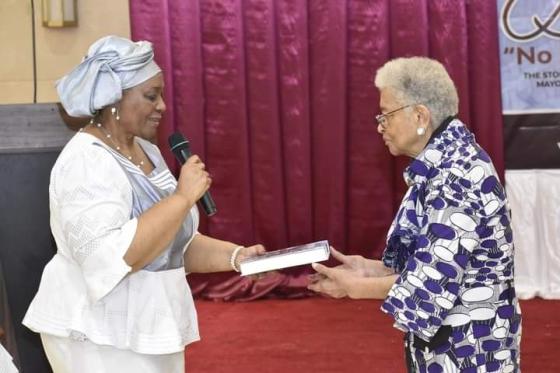Liberia: Solidifying Dr. Sawyer’s Legacy

Madam Sawyer presents a copy of the book to Former President Ellen Johnson Sirleaf
— Educational Foundation, book launched in his honor
The family of Dr. Amos C. Sawyer has launched an Educational Foundation in his name, along with a new book, entitled “No Land, No Vote”.
The book, written by the late Dr. Sawyer, highlights the contradictions in government practices that gave rise to mass actions that grew out of discontent and disenchantment with the true Whig Party (TWP) — led government.
Sawyer’s legacy is one of resilience, statesmanship, and commitment to democratic values. His role in steering Liberia through a tumultuous period and his contributions to academia and diplomacy has left an indelible mark in Liberia and across the African continent.
The foundation seeks to advance the ideals of good governance, transparency, and accountability by promoting political education, civic engagement, and leadership development.
It also invites political actors, activists, academicians, and members of the fourth estate to take keen interest in the book because it provides a lesson for good governance and the functions of political actors to introspect.
Sawyer’s book further highlights his participation in Liberia’s elections. Interestingly, the book according to the author, is not a theoretical academic book; but it is intended to explain Sawyer’s story, role and contributions to Liberian society.
Thelma E. Sawyer, widow of the late political scientist, mentioned that the foundation aims to contribute to bridging the governance gaps in the sub-region by fostering a democratic culture, thereby facilitating debates on public policy issues, and supporting policymaking that is evidence-informed.
“The overall objective of the Foundation is to honor the legacy of the late Sawyer by creating and establishing a non-profit organization for the purpose of addressing the multiple issues of democratic governance, rule of law, and peace building to address local, national, and geo-political issues in the body politic and general governance structure of Liberia and other societies where and when legally applicable,” she stressed.
She, however, explained that her late husband started working on the book in 1979, and he kept all his records and did the first draft. After he decided to withdraw from politics, he thought about going back to education, his focus being on the civics book from grades 1 through 6. According to her, he put a lot of time into the book.
“My husband also decided to work with the current Dean of the college, Dr. Josephus Gray, and Mohammed Sheriff to ensure that this is done; they did the book half way, and another half was left out,” Sawyer explained. “One thing he told me was that if the book is not finished, the Liberian people will not know his role. Everything that is in the book was designed by him.”
She, however, used the occasion to personally acknowledge President George M. Weah for naming the Science and Humanities College of the University of Liberia in honor of her late husband and for being the first person to have donated the first 10 computers.
Meanwhile, former President Sirleaf, who served as the chief launcher, remembered her interactions and associations with Sawyer over many years. “Sometimes we agreed, sometimes we disagreed.
“But one thing that I admired was that he respected everyone for whatever [they] stood for,” she said. “I am glad that I stand here today to form part of this book launch. It is important to appreciate his life because he stood for liberty, good governance, justice, democracy, and equality that we all yearned for.”

Sirlead recalled that the late professor was a prominent Liberian political figure who played a significant role in Liberian history. His leadership and dedication to rebuilding Liberia continue to inspire future generations of political leaders.
Sirleaf, however, said the launch of the book and the foundation are all part of the same story of Sawyer, who was loved and cherished by everyone.
She, therefore, encouraged Liberians to read the book so that they could be enlightened about his contributions to Liberian society. “The story in the book is so real,” she concluded.
Also speaking, Dr. Togba-Nah Tipoteh also appreciated the Sawyer family for keeping the dreams and aspirations of their father and husband alive. He acknowledged that it could not have happened if they were not committed to the struggle.
Tipoteh, who also made significant inputs to the book, however expressed the hope that Liberians will see the launch of the book as an awareness campaign that will drive change in society.
Dr. Togba-Nah Tipoteh, who made significant input to the book, expressed hope that Liberians will see the launch of the book as an awareness campaign that will drive change in society.
“The book is 372 pages, and I was one of the contributors to the book. Dr. Sawyer appreciated me a lot because in that book you get to know what your mistakes are in life and correct those mistakes,” Tipoteh said.
“We are hoping that those who will read the book, especially young people, will listen to the fact that it is important for us to work for justice, which means treating everybody the same. In order to have that justice, we must have a good electoral process because if we don’t have that, good people will not be elected.”

